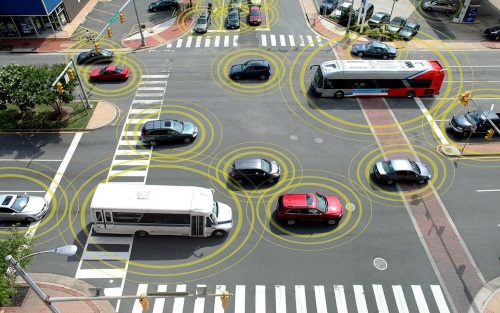A variety of near-term and future mobility issues will rely on an “operational perspective” to help develop solutions – including everything from COVID-19 response to autonomous vehicles and mileage-based user fee or MBUF funding strategies.
[Above graphic by the USDOT.]
That proved the key takeaway from the virtual annual meeting of the American Association of State Highway and Transportation Officials Committee on Transportation Operations (CTSO) held September 29 through October 2.
“Operations doesn’t usually care about normal; operations cares about what happening right now and how we address it,” explained Martin Knopp, associate administrator for operations at the Federal Highway Administration, during the CTSO conference’s plenary session on September 29.

Jim Tymon, AASHTO’s executive director, noted during the plenary session that “helping each other” when it comes to operations includes everything from managing overweight/oversize truck permits across state lines to preserving the 5.9 gigahertz (GHz) wireless communication spectrum for transportation needs.
“How the state DOT community dealt with the spike in overweight and oversize truck permits at the beginning of the COVID-19 pandemic is important for the nation in general,” he explained. “This was a priority at very beginning of pandemic because those permits proved vital to getting critically important goods to market – especially medical supplies.”
On the technology front, Tymon added that preserving the 5.9 Ghz spectrum “is still a front-burner issue for the transportation industry; we are still opposing the Federal Communication Commission’s recommendation to reallocate spectrum away from transportation safety.”

He added that he appreciates the support of U.S. Transportation Secretary Elaine Chao and other key industry groups such as the Intelligent Transportation Society of America pushing to keep that communication spectrum reserved for transportation safety needs.
“Hopefully we will prevail as many now realize just how important this spectrum is for the state DOT community and transportation industry as a whole,” Tymon added.
Trish Hendren, executive director of the Eastern Transportation Coalition (ETC) – formally known as the I-95 Corridor Coalition – added that the “customer base” is now changing for transportation and that operations holds the key to help the industry adjust to those changes; especially when it comes to data.

“Customers demand more information and more choices now, especially when it comes to travel information,” she explained during the conference plenary session. “Customer interaction is changing our field and changing how people move. As a result we need to bring more information to the user.”
That philosophy is one reason the ETC recently launched a second six-month pilot project that will run from October 2020 through March 2021 explore the feasibility of replacing the motor fuel tax with a mileage-based user fee or MBUF in a multi-state environment.

The organization’s first MBUF pilot – conducted in October 2018 – focused on passenger vehicles and commercial trucks traveling the I-95 corridor along parts of the eastern seaboard. The second pilot, however, is being expanded to the nation as a whole and hopes to involve 200 commercial trucks.
“We need to work together to bring this to everyone in the country: How do we go from a fuel tax to a user fee,” Hendren said. “It will also help us figure out where people are driving to and from what state they are coming from. Change like this is hard – the key is how to make it advantageous to all of us.”



